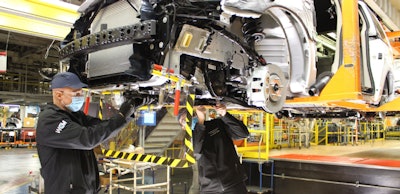
Toronto, Ontario — Federal and provincial governments form a pact with a pair of automakers, competition brews in the cold-resistant battery market and an autonomous cargo airline makes a deal with Transport Canada. This is the latest in electric and autonomous vehicles.
Courted with cash
In a truly Ross-and-Rachelesque turn of events, the federal and Ontario governments announced Thursday that are officially going steady with Stellantis and Volkswagen’s plans to build battery material factories in Windsor and St. Thomas, Ont.
With the announcement of this newly dubbed “Auto Pact”, the pair of governments have given the final greenlight to Stellantis and Volkswagen to begin, or in Stellantis’ case resume, building their respective EV battery production facilities in southern Ontario.
A combined $28 billion is also being made available to the pair of automakers, in the form of performance incentives, serving as the main driver of the pact. Alongside this is a stipulation that Stellantis announce a production mandate for its Brampton, Ont. assembly plant.
Chilly charging
Following in the footsteps of the recently unveiled Phoenix Cell battery, fellow Chinese battery developer CATL has also gotten in on the cold-proof battery game, unveiling Thursday a battery built around winter weather charging efficiency.
Wu Kai, CATL’s chief scientist, claimed at a forum in Shanghai recently that the electrolyte materials his company has developed can deliver a 50 percent increase in efficiency in extreme cold at minus 20 degrees Celsius and 43 percent under more normal temperatures.
Kai says that CATL has plans to begin mass producing a battery containing those electrolyte materials, in addition to boasting a 400 kilometre range and ten minute charge time.
He says the company’s goal for next year is to get that charge time down to a five to seven minute range.
Pilot-free puddle jumper
And now for a rare trip to the skies—Ribbit, an autonomous cargo airline, signed a $1.3 million contract with Transport Canada to conduct test flights of its self-flying aircraft over northern regions.
This contract will put a Ribbit autonomous aircraft into the government’s hands for about a year while they test the viability of pilotless cargo shipments to Canada’s north.
“Many rural and remote areas are served by larger airplanes that fly infrequently,” said Ribbit CEO Carl Pigeon. “Ribbit takes a smaller aircraft and uses autonomy to drastically change the unit economics of that plane. This lets us offer reliable next-day or two-day service and improve supply chains.”
Ribbit was issued a Special Flight Operations Certificate in 2022 authorizing uncrewed flight tests, and the company has received letters of intent from leading retailers totalling about $42 million per year.






















